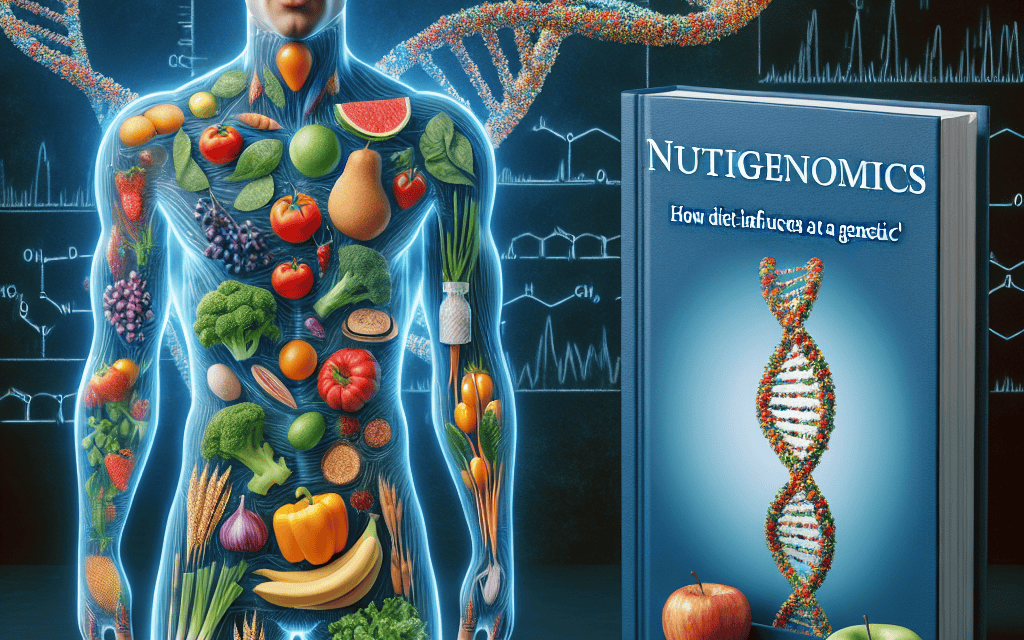-
Table of Contents
Nutrigenomics: How Diet Influences Health at a Genetic Level

Nutrigenomics is an emerging field that explores the intricate relationship between nutrition and genetics. It delves into how the foods we consume interact with our genes, influencing our health, susceptibility to diseases, and overall well-being. This article aims to provide a comprehensive understanding of nutrigenomics, its implications, and its potential to revolutionize personalized nutrition and healthcare.
Understanding Nutrigenomics: The Basics
Nutrigenomics is a branch of nutritional genomics that studies the effects of nutrients and dietary components on gene expression. It seeks to understand how individual genetic variations affect the way we metabolize and respond to nutrients. This field combines principles from molecular biology, genetics, and nutrition to provide insights into how diet can influence health at a genetic level.
The human genome, which consists of approximately 20,000-25,000 genes, plays a crucial role in determining how our bodies respond to different nutrients. Variations in these genes, known as polymorphisms, can affect nutrient absorption, metabolism, and utilization. Nutrigenomics aims to identify these genetic variations and understand their impact on health.
One of the key concepts in nutrigenomics is the idea of gene-diet interactions. These interactions can influence various physiological processes, including metabolism, inflammation, and oxidative stress. By studying these interactions, researchers can develop personalized dietary recommendations that optimize health and prevent disease.
- Gene expression: Nutrients can influence the expression of genes, turning them on or off, which can affect various biological processes.
- Epigenetics: Nutrigenomics also explores how diet can modify gene expression through epigenetic mechanisms, such as DNA methylation and histone modification.
- Metabolic pathways: Nutrients can impact metabolic pathways, affecting how the body processes and utilizes energy.
Overall, nutrigenomics provides a framework for understanding how diet and genetics interact to influence health outcomes. By unraveling these complex relationships, researchers hope to develop personalized nutrition strategies that promote optimal health and prevent chronic diseases.
The Role of Nutrigenomics in Disease Prevention
One of the most promising applications of nutrigenomics is its potential to prevent and manage chronic diseases. By understanding how genetic variations influence nutrient metabolism and disease risk, researchers can develop targeted dietary interventions that reduce the risk of conditions such as obesity, diabetes, cardiovascular disease, and cancer.
For example, studies have shown that certain genetic variations can affect an individual’s response to dietary fats. Some people may be more susceptible to the negative effects of saturated fats, leading to an increased risk of cardiovascular disease. By identifying these genetic variations, nutrigenomics can help tailor dietary recommendations to reduce this risk.
Similarly, nutrigenomics can play a role in managing diabetes. Research has identified specific genes that influence insulin sensitivity and glucose metabolism. By understanding these genetic factors, personalized dietary interventions can be developed to improve blood sugar control and reduce the risk of complications.
- Obesity: Genetic variations can influence appetite regulation, energy expenditure, and fat storage, affecting an individual’s risk of obesity.
- Cardiovascular disease: Nutrigenomics can help identify individuals who are more susceptible to the effects of dietary cholesterol and saturated fats, allowing for personalized dietary recommendations.
- Cancer: Certain nutrients and dietary patterns can influence cancer risk by affecting gene expression and DNA repair mechanisms.
Overall, nutrigenomics has the potential to revolutionize disease prevention by providing personalized dietary recommendations based on an individual’s genetic profile. This approach can help reduce the risk of chronic diseases and improve overall health outcomes.
Personalized Nutrition: Tailoring Diets to Genetic Profiles
Personalized nutrition is a key application of nutrigenomics, offering the potential to tailor dietary recommendations to an individual’s genetic profile. This approach recognizes that each person has unique genetic variations that influence their response to nutrients, and aims to optimize health by providing personalized dietary guidance.
One of the main goals of personalized nutrition is to identify genetic variations that affect nutrient metabolism and utilization. For example, some individuals may have genetic variations that affect their ability to metabolize certain vitamins or minerals. By identifying these variations, personalized nutrition can provide targeted recommendations to ensure optimal nutrient intake.
Personalized nutrition also considers an individual’s genetic predisposition to certain health conditions. For example, individuals with a family history of cardiovascular disease may benefit from a diet low in saturated fats and cholesterol. By tailoring dietary recommendations to an individual’s genetic risk factors, personalized nutrition can help prevent disease and promote optimal health.
- Genetic testing: Advances in genetic testing have made it possible to identify genetic variations that influence nutrient metabolism and disease risk.
- Dietary recommendations: Personalized nutrition provides tailored dietary recommendations based on an individual’s genetic profile, lifestyle, and health goals.
- Behavioral change: Personalized nutrition can also support behavior change by providing individuals with personalized feedback and guidance.
Overall, personalized nutrition offers a promising approach to optimizing health by tailoring dietary recommendations to an individual’s genetic profile. By considering genetic variations, lifestyle factors, and health goals, personalized nutrition can provide targeted guidance that promotes optimal health and well-being.
Case Studies: Real-World Applications of Nutrigenomics
To illustrate the potential of nutrigenomics, let’s explore some real-world case studies that highlight its applications in personalized nutrition and disease prevention.
Case Study 1: Cardiovascular Disease Prevention
A study conducted by researchers at the University of Toronto examined the impact of genetic variations on the response to dietary fats. The study found that individuals with a specific genetic variation in the APOA2 gene were more susceptible to the negative effects of saturated fats, leading to an increased risk of cardiovascular disease. By identifying this genetic variation, researchers were able to develop personalized dietary recommendations that reduced the risk of cardiovascular disease in these individuals.
Case Study 2: Diabetes Management
Researchers at the University of California, San Francisco, conducted a study to investigate the impact of genetic variations on insulin sensitivity and glucose metabolism. The study identified specific genetic variations that influenced an individual’s response to dietary carbohydrates. By tailoring dietary recommendations based on these genetic variations, researchers were able to improve blood sugar control and reduce the risk of complications in individuals with diabetes.
Case Study 3: Obesity Prevention
A study conducted by researchers at Harvard University examined the impact of genetic variations on appetite regulation and energy expenditure. The study found that individuals with specific genetic variations in the FTO gene were more susceptible to obesity. By identifying these genetic variations, researchers were able to develop personalized dietary interventions that promoted weight loss and reduced the risk of obesity in these individuals.
- Cardiovascular disease: Personalized dietary recommendations based on genetic variations can reduce the risk of cardiovascular disease.





